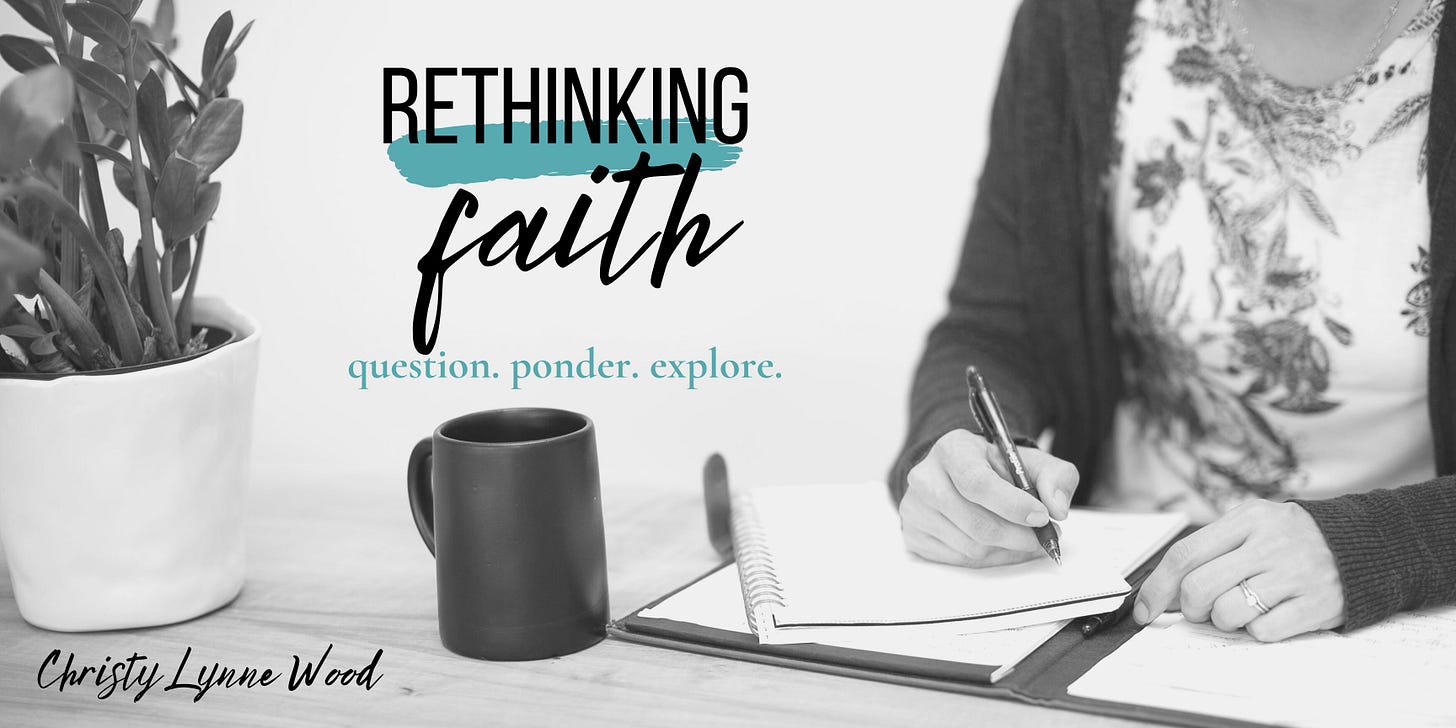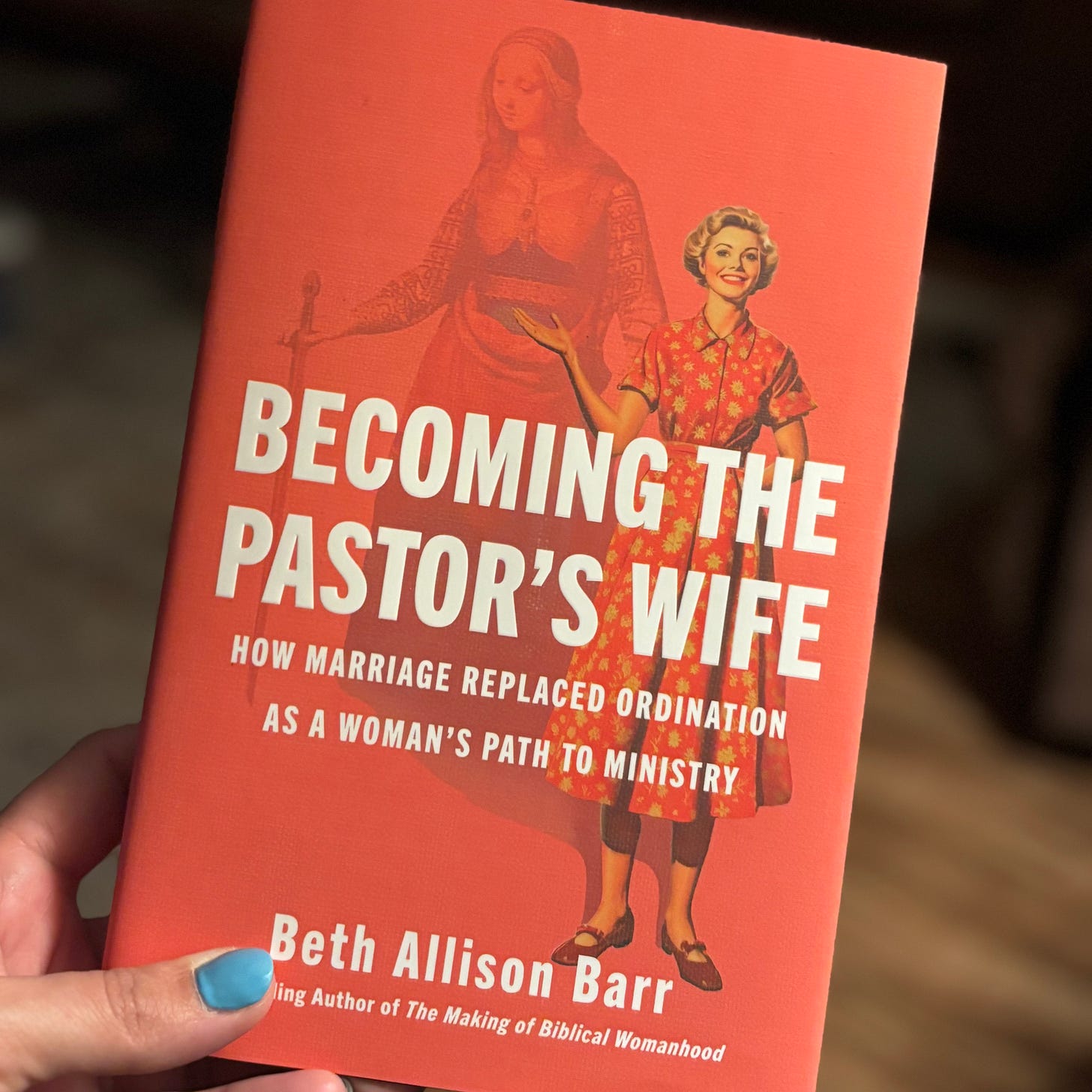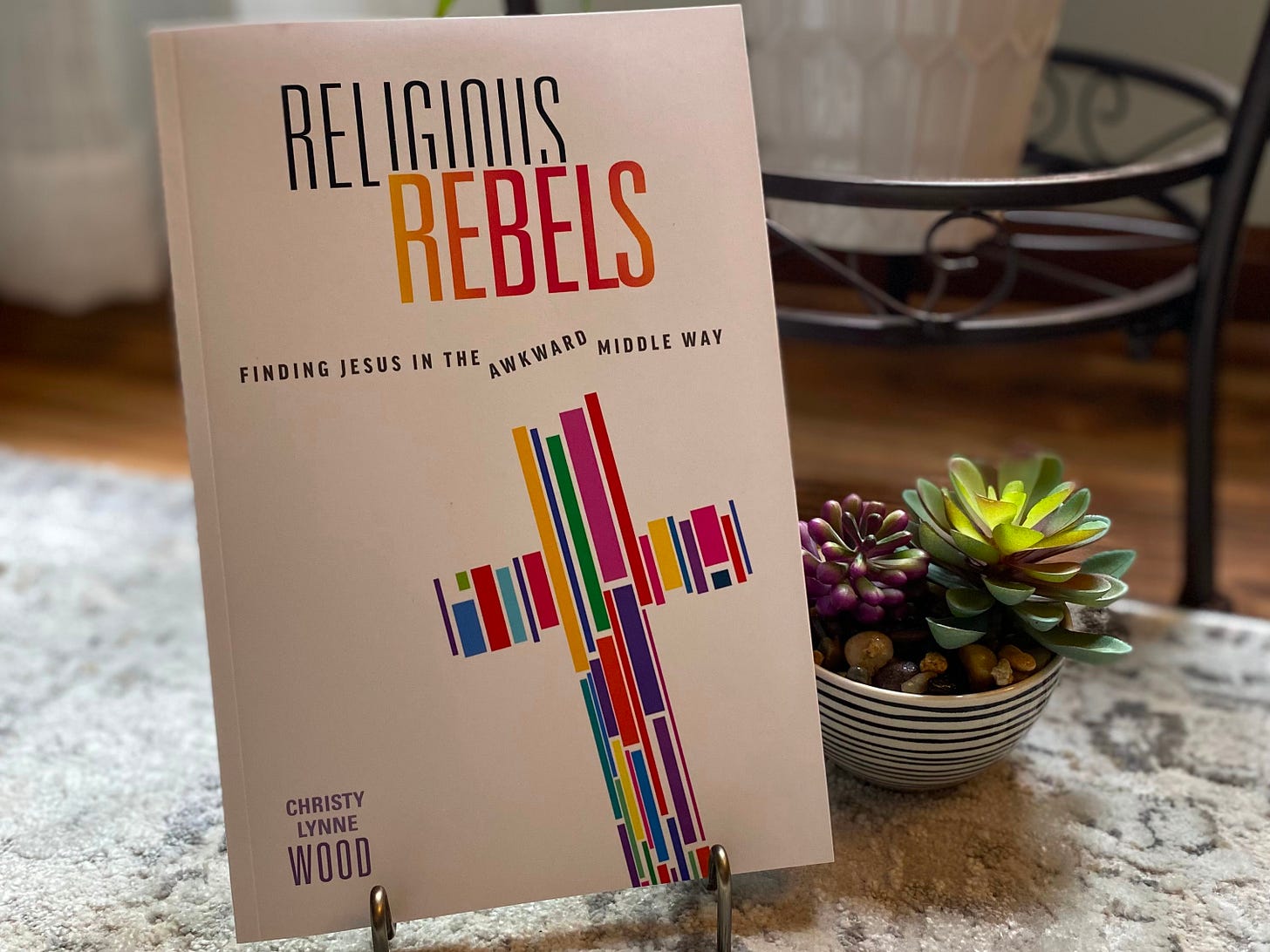Rethinking Faith: Deep Deconstruction, Pastors' Wives, and Living Grounded
This month we will explore a deeper deconstruction, question the role of the pastor's wife, and ponder what it looks like to live grounded and love like Jesus.
Rethinking Faith: March 2025
Welcome to the March issue of Rethinking Faith. This month we will explore deeper deconstruction beyond surface beliefs about faith, question the role of the pastor’s wife through Beth Allison Barr’s new book, Becoming the Pastor’s Wife, and ponder how we can open ourselves to living grounded and loving like Jesus. Thanks for being here!
The Necessary Deeper Deconstruction
When I first began using the word deconstruction seven or eight years ago I got push back. I still get push back. People in the deconstruction community have told me that I am not doing it right because my experience with faith deconstruction didn’t match the narrow definition that they often use. Church people have told me that I shouldn’t use the word because it sounds like I am walking away from the faith. I continue to use deconstruction because I want people who are questioning and doubting to realize that they have the option to reconstruct their faith.
I was, and continue to be, frustratingly orthodox but also uncomfortably edgy. I originally struggled with the exevangelical or deconstructed Christian spaces I found online because I didn’t fit with who they said I should be. But it often felt like the people in these spaces had switched the wrapping paper on the same old gift. They seemed like the other side of a familiar coin. They had new beliefs and behavior expectations, but I saw the same fundamentalist, legalistic attitude. Dualism was still very prevalent, because there were only two options. I felt the attitude I knew all too well that we are right and everyone else is wrong. I heard the unspoken if you are not just like us, then you are bad that I had believed for a decade. So, I never really connected in those spaces.

If you’ve been around here long enough, then you know that I am all about questioning religious tradition and manmade rules. I’ve rejected many of my old beliefs over the years. But even more than that, I’ve dug down into the8 places that made those beliefs comfortable.
I’ve questioned my fears, my desire for certainty, and my longing for significance. I’ve continued to acknowledge and work through the spiritual abuse that I’ve experienced—even as recently as a few months ago on a solo winter retreat that I’ll write about someday. Within my faith deconstruction and reconstruction journey, I’ve found healing. I know that I am healing because my anger has turned into grief and sadness, I can appreciate paradox and mystery. Having answers for everything is no longer important to me. I am able to make space for different opinions instead of insisting that mine are always right.
When we don’t do the hard work of healing before we jump into content creation, and when we hold onto anger and turn it into a platform, we end up with the situation
describes in his recent article about The New Evangelicals—a community for exevangelicals led by Tim Whitaker. Rick is a great journalist and his article gives all the needed details without being gossipy or sensational.The New Evangelicals (TNE) was one of the online communities where I struggled to connect. I’m grieved about what happened, but I think this is an excellent example of why we need to dig deeper in our deconstruction and work towards healing. The story is all too familiar to me and has awful parallels to my own recent experience within an evangelical church. This hierarchy and abuse of power is not Jesus. The whole point of my faith deconstruction and reconstruction has been to find and follow the real Jesus. I share with you, not because I’m trying to build a platform or gain a large following, but because I want you to be able to find Jesus too.
“The worst part is knowing how the disappearance of women’s independent leadership and the rise of a dependent ministry role tied to marriage had little to do with the Bible.” ~ Beth Allison Barr
On Thursday I got to drive eighteen minutes to Calvin University and see
in person at an event promoting her new book Becoming the Pastor’s Wife. I love living in West Michigan! We listened to Beth share about her reasons for writing another book and answer some audience questions. Then she did a book signing and I got to speak with her face to face. Beth is just as wonderful as I hoped she would be!When Beth published her first book The Making of Biblical Womanhood in 2020, reading it was the final nail in the coffin of my old beliefs about gender roles and women in ministry. I shut the book and was free! At the event at Calvin, Beth shared that she originally had no plans to write another book until a friend asked if she had anything else to say. Being a medieval historian and knowing church history, Beth Allison Barr realized she did have more to say. Many strict complementarian pastors such as John McArthur and John Piper have claimed that the church has held the same beliefs about women being in subordination for two thousand years, but Beth knew that wasn’t true.
In Becoming the Pastor’s Wife, Beth shares the story of Milburga, an eighth century abbess who lead a double monastery for men and women at Wenlock Priory. Milburga not only lead the abbey spiritually, but she had religious authority over the community at large. Her role was similar to that of a bishop in the church. At the event at Calvin, Beth Allison Barr shared yet another story of another abbess who led another double monastery. Women held offices of spiritual authority in the church, and it wasn’t until the twelfth and thirteenth centuries that this changed.
I am about halfway through Becoming the Pastor’s Wife and am just getting to a chapter called “Two for the Price of One". As a former pastors wife, I felt that myself. In reality we were both youth pastors, but only one of us got paid and held the title. I pastored alongside my husband because I wanted to, because I was also called to ministry, but I also felt the expectation that pastor’s wives served in the church.
I’m excited to read another book by Beth Allison Barr. As a historian, she is full of facts and stories of real women who lived and served in leadership roles. I can’t wait until I get to the part where she talks about what she found in her five trips to the Southern Baptist Archives. I have a feeling this book is just getting started. You can order Becoming the Pastor’s Wife here.
Loving Like Jesus and Living Grounded
I’ve never wanted to be a content creator, but I have felt the struggle to find time to write while working a fulltime job. Lately, I simply feel grateful to have a job that uses my gifts while keeping me grounded in the reality of my own limited abilities. Helping to regulate dysregulated children is not an easy task.

If I were able to write and speak for a living, I think I might get inside my own head. I’d be far too theoretical. I’d make too many assumptions that may or may not be true. As a behavior specialist I have to live embodied. Theory is great but it doesn’t always work in reality, and sometimes what does work is surprising.
I have one kindergartener who is still taking up the majority of my time. This little person has a lot going on both at home and in their own body and mind. They have made progress, but every day is an unexpected adventure. My natural assumptions would be that they need understanding love and gentle support. What actually works? Strict boundaries, rigid consistency, and immediate feedback. They need Mrs. Wood to be ridiculously firm, give them silent timeouts, and refuse to budge on anything. I have to be a solid emotional wall that they can fling themselves into. Then they feel safe and can calm down.
Every day I work a job that forces me to live in my body so that the children I am helping can live in theirs. I offer a loving, consistent presence that they can trust. I support them at school, and then I come home. It’s been an interesting year. I’m really good at what I do, and I feel like I am living into my giftedness. It’s hard and sometimes exhausting, but I like it.
has a new book coming out in August about calling and I can’t wait to read it, because I feel like it will surprise me while also confirming some things. How is your real life a place where you can love like Jesus? How is it a place that grounds you?As always, I'd love to hear your thoughts, questions, or comments. You can find me on Threads, Instagram, Facebook, in the Substack app, and on my website. I’d love to connect with you on any of these places!
My podcasts, Religious Rebels and Looking for the Real God can be found here on Substack, and on YouTube, Apple Podcasts, Spotify, iHeart Radio, and anywhere you listen to podcasts.
You can order an autographed copy of my book, Religious Rebels: Finding Jesus in the Awkward Middle Way by clicking on the button below. Or you can find it on Amazon.










I haven’t read either of those books but I’m intrigued now. I love what you shared about how being a behavior specialist causes you to live embodied. Isolationism seems to be so prevalent in some Christian circles. I’m curious how many Christian books would be written differently if the authors were truly integrated into the world in terms of neighborhood, school, jobs.
I've probably said this before, but when I read things like 'people said I'm doing it wrong' or 'you shouldn't [whatever]', that tells me that the people saying that don't understand deconstruction. The fundamental characteristic of deconstruction is that it is the throwing off oth others' expectations and requirements, and freeing up the believer to walk with God without regard to others' input (and that includes my writing too!) Sure, we can listen to others, but the key thing is that we are free to accept, reject or hold in thought anything that others say, and without being
'accountable' to them as to whether or not we accept their input. There is no right or wrong way to deconstruct, because each of us needs to deconstruct different things. For you, you had a huge deconstruction because of your church background, it being far more culty than mine was. My church was just a simple and straightforward Charismatic house church, so most of what I deconstructed would be far different from what you deconstructed (of course there was some overlap!). Each person's deconstruction reflects what they need to deconstruct, then. In fact, there *is* a way of 'deconstructing wrong', and that's to do it according to a set of rules, whatever form these may take. Best way is just to relax and let the Spirit do it all, however long it takes. And for me the hardest thing was seeing my precious wife worrying about me and my apparent 'loss of faith', although that wasn't what happened at all. Fortunately, and with God's great timing, I emerged from my chrysalis into my butterfly faith a couple of years before she died, so she saw what God had been doing for that fifteen years that it took. But it had to be done in a way suitable for me, personally; of course God is the Great Architect for all that sort of thing, so it all worked out fine. There really is no 'one size fits all' when it comes to deconstruction.